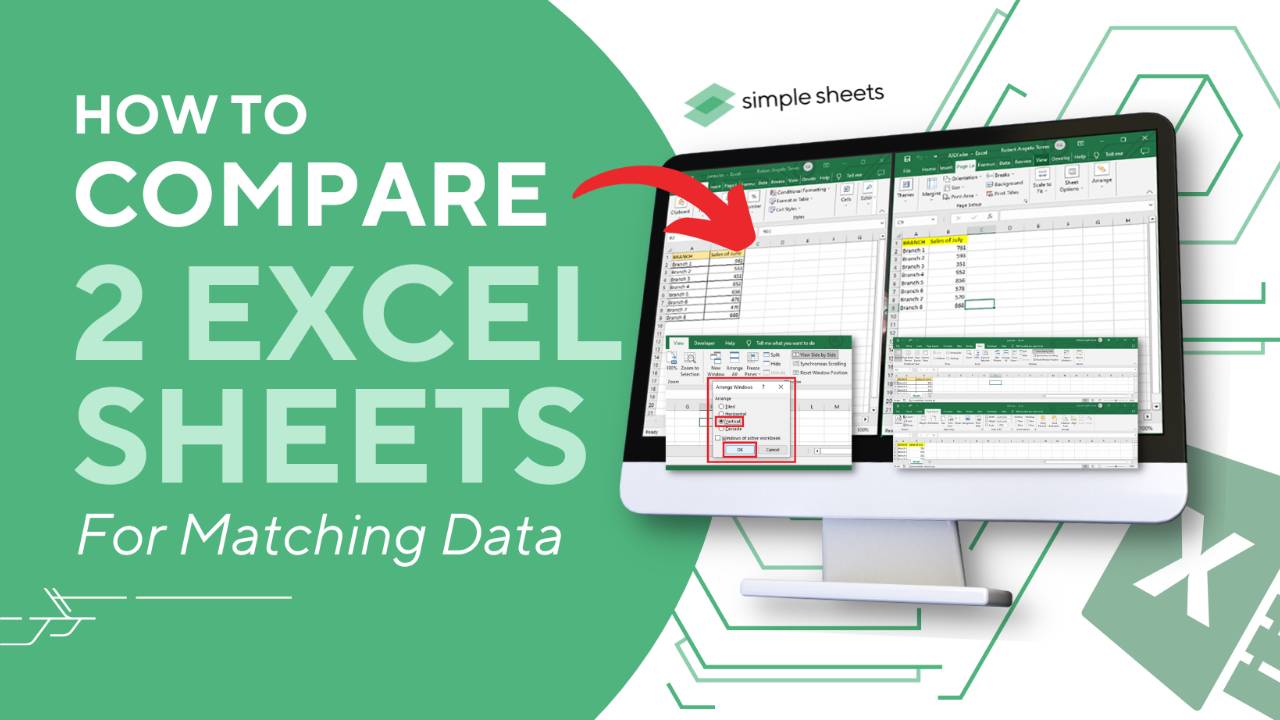Compare Excel Sheets: Find Value Similarities Easily

Excel, Microsoft's powerful spreadsheet software, is a favorite among professionals across various industries due to its robust data manipulation capabilities. One common challenge users encounter is comparing two or more Excel sheets to find similar values or duplicates. In this blog post, we will explore various methods to efficiently compare Excel sheets and find value similarities, using techniques that range from manual approaches to employing Excel's built-in functions and third-party tools.
Why Compare Excel Sheets?

Comparing Excel sheets can be essential for numerous reasons:
- Data Validation: Ensuring data integrity when merging data from multiple sources.
- Spotting Duplicates: Identifying and removing repeated entries to maintain clean datasets.
- Data Reconciliation: Matching records for financial or inventory management.
- Error Detection: Finding discrepancies or errors in data entry or data processing.
Manual Comparison Techniques

Before diving into automated methods, understanding how to manually compare Excel sheets can provide insight into the logic behind automated processes:
Side-by-Side Comparison

The simplest way to compare sheets is by manually reviewing them side by side:
- Open the Excel workbook containing the sheets to compare.
- Click on the first sheet and drag the split bar to view both sheets simultaneously.
- Scroll through both sheets, looking for similar values.
🔍 Note: This method is time-consuming and prone to human error, especially for large datasets.
Using Excel Functions for Comparison

VLOOKUP for Exact Match

VLOOKUP, or Vertical Lookup, is a handy function for finding specific values in another column:
=VLOOKUP(A2,Sheet2!A:B,2,FALSE)This formula checks if the value in cell A2 of the first sheet exists in column A of Sheet2, and if so, returns the corresponding value from column B in Sheet2. If there is no match, Excel will return #N/A.
INDEX-MATCH for Flexibility

The combination of INDEX and MATCH functions offers greater flexibility than VLOOKUP:
=INDEX(Sheet2!B:B,MATCH(A2,Sheet2!A:A,0))MATCH looks for A2 in the first column of Sheet2, and INDEX retrieves the corresponding value from column B. This method is not limited by the lookup column’s position.
Advanced Methods Using Excel's Power Tools

Conditional Formatting for Visual Match

Excel’s conditional formatting can visually highlight cells with matching or unique values:
- Select the range of cells you want to compare.
- Go to Home > Conditional Formatting > New Rule.
- Choose “Use a formula to determine which cells to format.”
- Enter a formula like:
=COUNTIF(Sheet2!A:A,A1)=0 - Choose a format to highlight cells with no match.
Using Power Query to Merge Sheets

Power Query, available in Excel 2010 and later, is an excellent tool for comparing and merging sheets:
- In the Data tab, select From Table/Range to load data into Power Query.
- From another workbook, load the second sheet.
- Merge the tables based on a common column using Home > Merge Queries.
- Filter for matching values or use the Full Outer merge to see all data points, including non-matches.
💡 Note: Power Query provides a more automated and dynamic approach to data comparison, suitable for recurrent tasks.
Third-Party Tools for Comparing Sheets

Using Excel Compare by Aspose

Tools like Aspose.Total Excel Compare allow for advanced comparison of Excel files:
- It identifies differences in values, formulas, and formatting.
- Generates a visual report of differences or an Excel file highlighting changes.
- Supports comparisons across different Excel file formats.
Best Practices and Tips

When comparing sheets, here are some tips to streamline your workflow:
- Structure Your Data: Ensure consistent column headers and data formats across sheets.
- Use Named Ranges: Named ranges make formulas and references more intuitive.
- Keep Your Comparison Clean: If possible, compare sheets in the same workbook to avoid external reference issues.
- Document Your Process: Record your steps or formulas used for future reference or to share with others.
Understanding and Addressing Common Challenges

Data Mismatches

Sometimes, values might not match due to formatting issues:
- Ensure no trailing spaces exist in cells by using TRIM() function.
- Check for case sensitivity in text comparisons.
- Consider dates or numbers being stored as text, which could cause mismatches.
Performance Considerations

Comparing large datasets can be resource-intensive:
- For very large datasets, consider using Excel’s Power Pivot for in-memory analysis.
- Utilize array formulas or VBA scripts for bulk operations to reduce processing time.
As we conclude this exploration of comparing Excel sheets, remember that the choice of method depends largely on the complexity of the data and the frequency of the task. From manual checks to sophisticated tools like Power Query and third-party software, each approach has its merits. With practice, you'll find the right balance of speed, accuracy, and efficiency in your Excel data comparison tasks. Whether for quality control, data integration, or error detection, mastering these techniques will significantly enhance your productivity with Excel.
What’s the most efficient way to compare two large Excel sheets?

+
Using Excel’s Power Query for merging and comparing sheets is often the most efficient method for large datasets. It provides an automated, dynamic approach that can handle large volumes of data with ease.
Can I compare sheets in different workbooks?

+
Yes, you can use Excel’s VLOOKUP or Power Query to reference data from different workbooks, but ensure both workbooks are open for dynamic references to work.
How can I highlight differences between two sheets?
+Conditional formatting or third-party tools like Aspose.Total Excel Compare can visually highlight differences or create reports detailing the differences between sheets.



